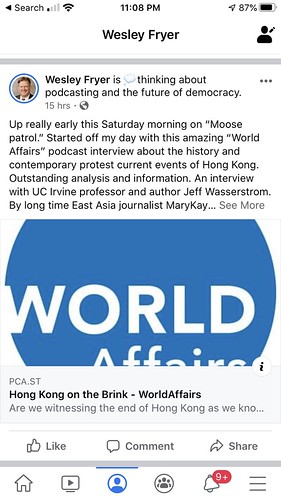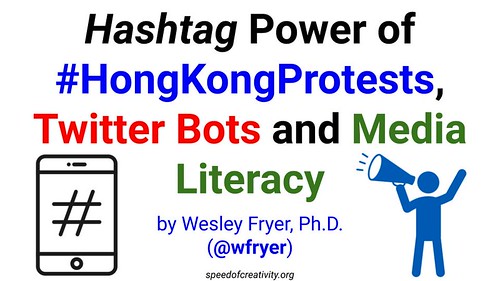Yesterday morning I listened to a fantastic World Affairs (@world_affairs) podcast interview with UC Irvine professor, historian, and author Jeff Wasserstrom (@jwassers) by MaryKay Magistad (@MaryKayMagistad). Dr. Wasserstrom is the author of “Vigil: Hong Kong on the Brink” from February 2020, which was also the title of the interview from February 5, 2020. Dr. Wasserstrom also published “China in the 21st Century: What Everyone Needs To Know” in 2013. When I shared a link via Twitter to this recent World Affairs podcast episode, I used several hashtags including #HongKongProtests. 24 hours after sharing that tweet it now has over 1000 likes and 1000 retweets, last night (18 hours after sharing) it already had 700. This is NOT the “norm “for my tweets, in fact, this is probably the most liked and retweeted message I’ve ever shared on Twitter. In this post I’d like to reflect on the power of Twitter hashtags, the role of bots (automated algorithms) in our information ecosystem, how we are each involved in PsyOps (psychological operations) online today, and how these ideas relate to media literacy.
As soon as I saw hundreds of likes and retweets on that post yesterday, I automatically thought that “twitter bots” were likely the cause. If you haven’t watched it yet, I highly commend Destin Sandlin’s (@smartereveryday) April 2019 video, “The Manipulation of Twitter.” The speed and number of likes and retweets was increasing so fast, it seemed like an algorithm was likely involved.
Yesterday and today I received a few Twitter @reply messages sharing appreciation for my tweet from apparent Hong Kongers, as well as some replies with additional information about the situation they continue to face. I don’t think those were algorithmic, they “felt” and looked authentic. But I honestly have no way of knowing for sure what percentage of likes and retweets on that tweet were shared by actual human beings, and how many were algorithmically generated.
This brings me to the “media literacy” point of this post: How many people using the Internet and social media websites today realize how “automated bots” and “click farms” are shaping the information and media landscape in which we live every day? Why does this matter? It matters because our news and information ecosphere is a true “wild west” of diverse actors today, where data, memes, videos and tweets are literally WEAPONIZED to advance specific political goals. As the summer 2019 documentary “The Great Hack” (streaming on Netflix) points out, everyone on Facebook and other social media sites online is likely the target of ongoing PsyOps (Psychological Operations) which are:
operations to convey selected information and indicators to audiences to influence their emotions, motives, and objective reasoning, and ultimately the behavior of governments, organizations, groups, and individuals.
“Psychological Operations (United States).” Wikipedia, 31 Jan. 2020. Wikipedia, https://en.wikipedia.org/w/index.php?title=Psychological_operations_(United_States)&oldid=938414917.
My personal political views are definitely with the students of Hong Kong and other Hong Kong residents, struggling to assert and legally codify their basic human rights for self-determination and freedom of expression. These are embodied in the Universal Declaration of Human Rights. I will be both joyful and thankful if any of my tweets, blog articles, or other social media posts help amplify the struggle, cause and plight of the Hong Kong pro-democracy and pro-human rights protesters.
This situation provides some important (and perhaps enlightening) insights into our information and social media landscape, however, which could make a good discussion topic with your students if you are a classroom teacher. I will be sharing and discussing this with my own 5th and 6th grade Digital and Media Literacy students this week, but in a limited way which does not delve TOO deeply into the rabbit holes. In our middle school computer classes, we are mainly focusing our media literacy discussions on advertising and the intentional sharing of a message with a particular purpose, for a specific audience. Our lessons about creating ‘InfoPics” and trying to “avoid being tricked online” are examples.
Not all cases of “social media virality” are positive or constructive, however. The November 2011 situation involving a Kansas High School student on a trip to the state capital in Topeka critically tweeting about the governor on the bus ride back comes to mind, as does the infamous “Justine Sacco incident” documented in the English WikiPedia article for “Online Shaming.” We need to be careful what we tweet, because the nature of Twitter and our wider social media ecosystem means any of us can readily be amplified on the global stage, and not always to positive effect. The November 2019 New York Times article, “What Happens When Ordinary People End Up in Trump’s Tweets” includes more examples worth considering.
It is important to understand the HUGE difference between social media sharing on a platform like Facebook versus Twitter. For paying advertisers micro-targeting specific demographic groups, Facebook is like a precision smart weapon. The power to wield Facebook in world changing ways lies with paying advertisers and the Facebook employees responsible for the algorithm of the news feed. Twitter, in contrast, is a much more user-empowering platform. It’s being weaponized by a variety of actors, without a doubt, but its power… and specifically “the power of the hashtag,” makes Twitter a qualitatively different communications platform and information medium than Facebook. My tweet about Hong Kong from yesterday has over 1000 likes and retweets. My Facebook post shared at the same time, with the same content, has ZERO likes and ZERO re-shares. Hashtags have power and potency on Twitter which they do NOT have on Facebook.

“Zero Facebook Likes or Shares” (CC BY 2.0) by Wesley Fryer
One more important issue related to this tweet comes to mind, which I’ll share as I close. We need more K-12 teachers and professors in higher education actively using Twitter. Why, you ask? The reason is that Twitter has a HUGE influence on mainstream media and the information millions of people access on a daily basis. The dynamics I’ve referenced in this post of social media weaponization, Twitter bots amplifying specific hashtags and messages, and ongoing PsyOps to promote political propaganda are ongoing and GROWING. As I’ve mentioned multiple times on the weekly podcast and webshow I co-host, “The EdTech Situation Room” (@edtechSR), our 2020 Presidential election cycle in the United States is likely to make the 2016 contest seem like a kickball game relative to a brutal World Cup Rugby match. See my December 2019 post, “Tips for Media Literacy and Avoiding Foreign Political Propaganda Influence,” for more on these themes. To really understand a media platform, you need to personally use it. Twitter is “too big to ignore” in our society today, for anyone interested in literacy and communication. That group should include all K12 teachers as well as university faculty members.
To learn more about media literacy as well as digital literacy, I commend “The Summer Institute on Digital Literacy,” which I attended in July 2019 in Rhode Island and will be held in Chicago in July 2020. You can learn more about my experiences in the podcast reflection I shared after this wonderful week of professional development. Media literacy is critical for all of us. The information landscape of 2020 continues to evolve and morph around us, and hashtag power is one “sign of our times” highlighting how different our news cycle and media diet has become.

“Hashtag Power of #HongKongProtests, Twitter Bots and Media Literacy” (CC BY 2.0) by Wesley Fryer
If you enjoyed this post and found it useful, consider subscribing to Wes’ free, weekly newsletter. Generally Wes shares a new edition on Monday mornings, and it includes a TIP, a TOOL, a TEXT (article to read) and a TUTORIAL video. You can also check out past editions of Wes’ newsletter online free!
Did you know Wes has published several eBooks and “eBook singles?” 1 of them is available free! Check them out! Also visit Wes’ subscription-based tutorial VIDEO library supporting technology integrating teachers worldwide!
MORE WAYS TO LEARN WITH WES: Do you use a smartphone or tablet? Subscribe to Wes’ free magazine “iReading” on Flipboard! Follow Dr. Wesley Fryer on Twitter (@wfryer), Facebook and Google+. Also “like” Wes’ Facebook page for “Speed of Creativity Learning”. Don’t miss Wesley’s latest technology integration project, “Show With Media: What Do You Want to CREATE Today?”
Source : Hashtag Power of #HongKongProtests, Twitter Bots, PsyOps and Media Literacy












